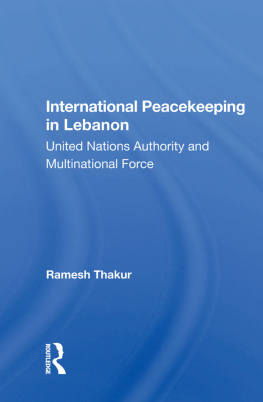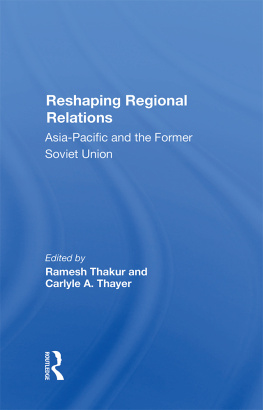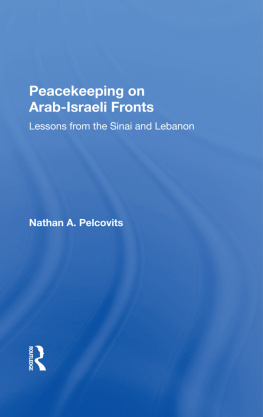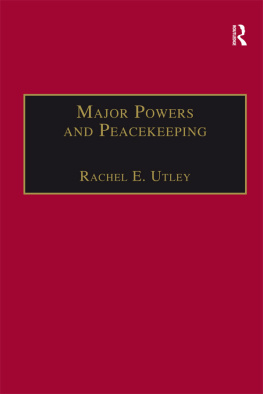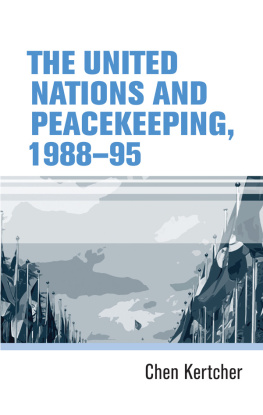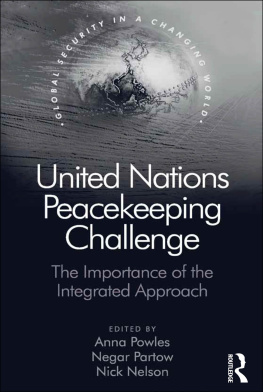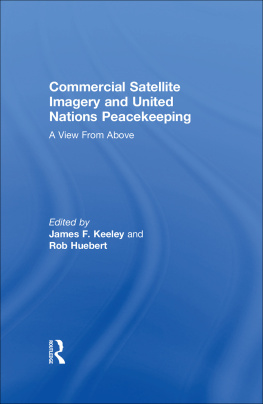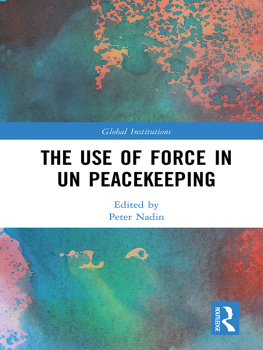International Peacekeeping in Lebanon
About the Book and Author
"Ramesh Thakur's precise and informed presentation of international peacekeeping is by far the best study on the subject that now exists, at once, scholarly, engaging, and eminently practical. A welcome, major achievement."
Richard Falk Woodrow Wilson School of Public & International Affairs, Princeton University
Examining the efficacy of U.N. peace efforts, Dr. Ramesh Thakur compares limited peacekeeping through U.N. authority with more coercive means such as the Multinational Force (MNF) in Lebanon. He finds that the role of the U.S.-led MNF coalition cannot be justified in terms of great-power responsibility for ensuring a stable international order, since the coalition has attempted to substitute military power for authoritative peacekeeping. When MNF legitimacy was questioned and authority was challenged, the MNF's use of force in response to those challenges switched the coalition's role from third-party peacekeeper to factional participant. As a result, every successive attempt to strengthen the MNF mandate has further subordinated the concept of neutral international peacekeeping to calculated support of national interests. If reasoned attempts to keep the peace are not to collapse into exercises in national self-interest, then peacekeeping responsibilities must remain with the U.N., supported by the great powers: Only the U.N. can provide an authoritative exposition of values within the context of international society and bestow international legitimacy upon peacekeeping activities; only the great powers can back the U.N. with requisite force.
Dr. Ramesh Thakur teaches political studies at the University of Otago, New Zealand, and is that country's correspondent for The Asian Defence Journal.
International Peacekeeping in Lebanon
United Nations Authority and Multinational Force
Ramesh Thakur
First published 1987 by Westview Press, Inc.
Published 2018 by Routledge
52 Vanderbilt Avenue, New York, NY 10017
2 Park Square, Milton Park, Abingdon, Oxon OX14 4RN
Routledge is an imprint of the Taylor & Francis Group, an informa business
Copyright 1987 Taylor & Francis
All rights reserved. No part of this book may be reprinted or reproduced or utilised in any form or by any electronic, mechanical, or other means, now known or hereafter invented, including photocopying and recording, or in any information storage or retrieval system, without permission in writing from the publishers.
Notice:
Product or corporate names may be trademarks or registered trademarks, and are used only for identification and explanation without intent to infringe.
Library of Congress Cataloging-in-Publication Data
Thakur, Ramesh Chandra, 1948
International peacekeeping in Lebanon: United Nations authority and multinational force
(Westview special studies in peace, conflict, and conflict resolution)
Bibliography: p.
Includes index.
1. United NationsArmed ForcesLebanon. 2. Multinational Force in Lebanon. I. Title. II. Series.
JX1981.P7T48 1987 341.5'8 87-6297
ISBN 13: 978-0-367-01290-8 (hbk)
The origins of this book lie in a longstanding interest in peacekeeping, in an earlier study of peacekeeping in Vietnam which suggested certain parallels, and in an international workshop on the Multinational Force in Beirut which was held in Oslo in October 1985. Many thanks are due to my students at the University of Otago for their continuing discussions of the issues raised in this book, to Mrs Jeanette Bonar and Mrs Betty Larkins for the care and good cheer with which they typed and retyped the manuscript, and to Donald Ellis of the University of Otago Computing Services Centre for coming to our assistance once again in our perennial battles with the word processor. The appendixes are sourced, unless otherwise indicated, from the U.S. Department of State publication Bulletin, the U.S. Weekly Compilation of Presidential Documents, and the UN Chronicle.
1
Introduction
In his annual report to the United Nations in 1984, the Secretary-General began by noting his increased conviction "of the need to preserve and strengthen the Organization as a centre for harmonizing the actions of nations." An extended and tolerable future for the human race can be assured only if the goals and principles expressed in the Charter of the United Nations become the basis of the day-to-day relations of nations. The Preamble to the Charter expresses the determination of the peoples of the United Nations "to save succeeding generations from the scourge of war"; and, to this end, "to unite our strength to maintain international peace and security" and "to ensure, by the acceptance of principles and the institution of methods, that armed force shall not be used, save in the common interest."
Unfortunately, the tendency since the Second World War has been for the "common interest" in international peace and security to be asserted only when the situation has deteriorated to a dangerously critical stage. The future of humanity has no political or bureaucratic constituency to lobby national governments on its behalf; short-term national interests therefore override the common interest. The prospect of governments conducting their daily international business by the rules of the U.N. Charter appears to be no nearer in sight in 1987 than it did in 1945 at the time of the adoption of the Charter. Javier Prez de Cullar observed that:
The achievements of the United Nations during the four decades of its existence may be modest, but they are not insignificant. Nevertheless, as the Secretary-General himself conceded:
...the fact of the matter is that the three main elements of a stable international order - an accepted system of maintaining international peace and security; disarmament and arms limitation; and the progressive development of a just and effective system of international economic relations - have yet to take hold as they should.
International peacekeeping is one of the more interesting and, arguably, also one of the more important developments in contemporary world affairs. Somewhat paradoxically, 1982 and 1983 were good years for highlighting both the need for and the limitations of international peacekeeping forces. In June 1982 the United Nations Interim Force in Lebanon (UNIFIL) was brushed aside contemptuously by Israeli forces sweeping triumphantly to Beirut. When the early ecstasies of apparent military victory turned into agonies of prolonged occupation, however, Israeli troops withdrew and handed over peacekeeping duties to a Multinational Force (MNF) in August 1982. A mere 20 months later the MNF crumbled under the combined weight of civil strife and international conflict. UNIFIL in the meantime soldiers on. But so too does the Multinational Force and Observers (MFO). Established in the Sinai a few months before the MNF, the MFO is still in tranquil existence. The paradox of simultaneous success and failure in different theatres nicely illustrates the two basic points about international peacekeeping. First, such forces are an indispensable instrument in the hands of the world community for tackling trouble spots in the existing international environment. Second, they are still an imperfect instrument, with major shortcomings and gaps. In short, they are necessary but not sufficient, and need supplementary measures in order to realize full potential. They also need to be understood properly in order to avoid disappointment and facilitate proper utilization.


